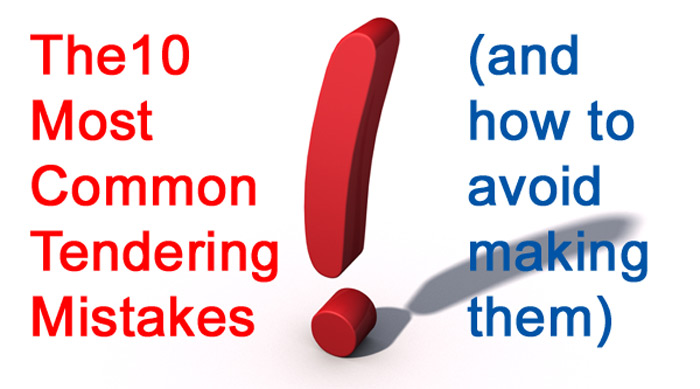When trying to write good tender / PQQ / RFP responses, a good starting point is to understand what are the most common tendering mistakes – you can then make sure you avoid them!

In no particular order:
1. Incorrect Cost Schedules
You normally have to complete a pricing template; this makes it easier for the buyers to compare the various submissions. If you get it wrong, your prices may not accepted or marked properly
2. Incorrect Formatting, Presentation & Non-conformance
A bit like the last one, if you don’t follow their format, you can get marked down.
3. Missing Information
For example: missing appendices. Simply put, if something is missing it cannot get marked! Sometimes you may get a second chance to provide whatever is missing but it’s unlikely.
4. Late submissions
This will almost certainly get your bid disqualified!
5. Incorrect Number of Copies Supplied
It’s common to be asked to submit multiple copies; sometimes different versions e.g. some without pricing. This enables the bid to be distributed to various members of the procurement team for marking. If you haven’t produced enough, you will have either made it hard work for the customer OR given them a reason not to mark everything (and lose points on your score).
6. Questions Missed / Unanswered
A question not answered cannot get any score except zero.
7. Not Understanding Questions / Incorrect Assumptions
It’s not unusual for questions to be ambiguous so don’t assume… find out what the question means. This way you will be certain to answer what is being asked – not what you think is being asked. If in doubt – ask. If you still don’t know how to answer it, try and get help.
8. Wrong Company Name
If you plagiarise or cut & paste, make sure you edit to change the name of your customer. It does not look good if you are bidding for someone’s business but show another organisation’s name!
9. Typos / Grammar
While you are not being marked on your command of the English language, when you are bidding for a major contract you must give the buyers confidence that yours is a professional organisation.
10. Lack of Understanding of Customer’s Business
You need to demonstrate that you know what their problems are or what they are trying to achieve. Avoid bland generic submissions that don’t show understanding. Worse still, do not just cut and paste a previous answer without personalising / editing it.
If you want improve your success with tendering, contact us for an informal discussion about our tender consultancy services.
Summary
There are three basic themes within these most common tendering mistakes. You need to:
- Try not to lose marks
- Show a professional image
- Make your submission relevant
There are many more things to watch for but please do avoid these fundamental tendering mistakes!
If you have any more ideas or comments, please add them…

